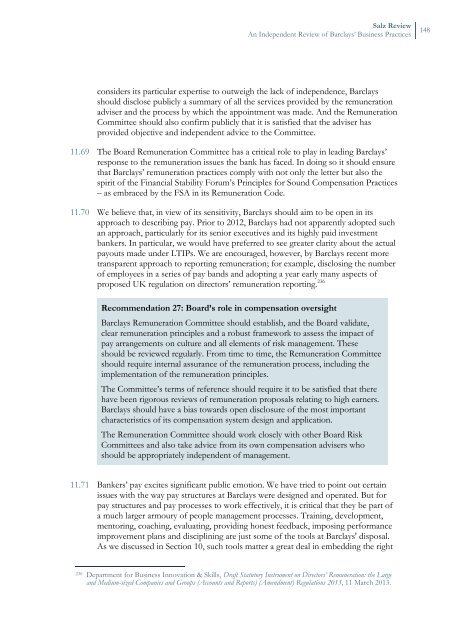Salz Review - Wall Street Journal
Salz Review - Wall Street Journal
Salz Review - Wall Street Journal
Create successful ePaper yourself
Turn your PDF publications into a flip-book with our unique Google optimized e-Paper software.
<strong>Salz</strong> <strong>Review</strong><br />
An Independent <strong>Review</strong> of Barclays’ Business Practices<br />
148<br />
considers its particular expertise to outweigh the lack of independence, Barclays<br />
should disclose publicly a summary of all the services provided by the remuneration<br />
adviser and the process by which the appointment was made. And the Remuneration<br />
Committee should also confirm publicly that it is satisfied that the adviser has<br />
provided objective and independent advice to the Committee.<br />
11.69 The Board Remuneration Committee has a critical role to play in leading Barclays’<br />
response to the remuneration issues the bank has faced. In doing so it should ensure<br />
that Barclays’ remuneration practices comply with not only the letter but also the<br />
spirit of the Financial Stability Forum’s Principles for Sound Compensation Practices<br />
– as embraced by the FSA in its Remuneration Code.<br />
11.70 We believe that, in view of its sensitivity, Barclays should aim to be open in its<br />
approach to describing pay. Prior to 2012, Barclays had not apparently adopted such<br />
an approach, particularly for its senior executives and its highly paid investment<br />
bankers. In particular, we would have preferred to see greater clarity about the actual<br />
payouts made under LTIPs. We are encouraged, however, by Barclays recent more<br />
transparent approach to reporting remuneration; for example, disclosing the number<br />
of employees in a series of pay bands and adopting a year early many aspects of<br />
proposed UK regulation on directors’ remuneration reporting. 236<br />
Recommendation 27: Board’s role in compensation oversight<br />
Barclays Remuneration Committee should establish, and the Board validate,<br />
clear remuneration principles and a robust framework to assess the impact of<br />
pay arrangements on culture and all elements of risk management. These<br />
should be reviewed regularly. From time to time, the Remuneration Committee<br />
should require internal assurance of the remuneration process, including the<br />
implementation of the remuneration principles.<br />
The Committee’s terms of reference should require it to be satisfied that there<br />
have been rigorous reviews of remuneration proposals relating to high earners.<br />
Barclays should have a bias towards open disclosure of the most important<br />
characteristics of its compensation system design and application.<br />
The Remuneration Committee should work closely with other Board Risk<br />
Committees and also take advice from its own compensation advisers who<br />
should be appropriately independent of management.<br />
11.71 Bankers’ pay excites significant public emotion. We have tried to point out certain<br />
issues with the way pay structures at Barclays were designed and operated. But for<br />
pay structures and pay processes to work effectively, it is critical that they be part of<br />
a much larger armoury of people management processes. Training, development,<br />
mentoring, coaching, evaluating, providing honest feedback, imposing performance<br />
improvement plans and disciplining are just some of the tools at Barclays' disposal.<br />
As we discussed in Section 10, such tools matter a great deal in embedding the right<br />
236 Department for Business Innovation & Skills, Draft Statutory Instrument on Directors’ Remuneration: the Large<br />
and Medium-sized Companies and Groups (Accounts and Reports) (Amendment) Regulations 2013, 11 March 2013.
















